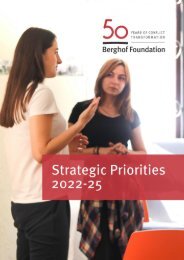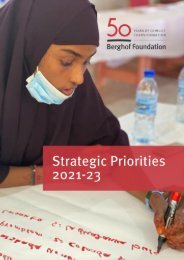Berghof Foundation: 50 years of conflict transformation
This book provides an overview of the Berghof Foundation’s work and impact over the past 50 years and sheds light on the challenges ahead of peacebuilding.
This book provides an overview of the Berghof Foundation’s work and impact over the past 50 years and sheds light on the challenges ahead of peacebuilding.
You also want an ePaper? Increase the reach of your titles
YUMPU automatically turns print PDFs into web optimized ePapers that Google loves.
Climate-pro<strong>of</strong>ing<br />
<strong>conflict</strong> <strong>transformation</strong><br />
112<br />
There is hardly any aspect <strong>of</strong> life that is not<br />
affected by climate change. At the <strong>Bergh<strong>of</strong></strong><br />
<strong>Foundation</strong>, we see that climate change impacts<br />
exacerbate existing <strong>conflict</strong>s or even create new<br />
ones — especially where resources such as water<br />
and arable land are becoming increasingly scarce.<br />
We also realise that a present-day solution to a<br />
<strong>conflict</strong> may quickly be undermined by climate<br />
change impacts still to come, such as increasing<br />
drought and desertification, shifting shorelines<br />
<strong>of</strong> lakes and rivers that define disputed borders,<br />
extreme weather events, and other forms <strong>of</strong><br />
environmental degradation.<br />
But climate change can also <strong>of</strong>fer the<br />
opportunity for peaceful <strong>conflict</strong> <strong>transformation</strong>,<br />
by using common concerns about climate<br />
change impacts as an entry point for bringing<br />
<strong>conflict</strong> parties to the negotiating table through<br />
environmental peacebuilding.<br />
Peacebuilding organisations such as the<br />
<strong>Bergh<strong>of</strong></strong> <strong>Foundation</strong> need to adapt the way they<br />
work to rise to these challenges, not least because<br />
many <strong>of</strong> the countries in which we are active<br />
(Afghanistan, Ethiopia, Iraq, Somalia, Sudan, Syria,<br />
Yemen, etc.) are situated in the worst-affected<br />
regions <strong>of</strong> the world. As a first step, we have<br />
started to build our own expertise in the field to<br />
be able to systematically include climate change<br />
impacts in our <strong>conflict</strong> analyses and identify<br />
environmental impacts on <strong>conflict</strong> early on in our<br />
engagement. This reflects Dieter Senghaas’s<br />
recommendation (see page 36) that in its work,<br />
the <strong>Bergh<strong>of</strong></strong> <strong>Foundation</strong> should build on its<br />
tradition <strong>of</strong> establishing bridges between social<br />
and natural sciences.<br />
However, rather than becoming climate<br />
scientists ourselves, we are building networks and<br />
reaching out to research institutions that focus on<br />
climate change. Forging new partnerships will not<br />
only give us access to the most recent knowledge<br />
and data for our analysis, but will also help develop<br />
important synergies to contribute to a collective<br />
understanding <strong>of</strong> the <strong>conflict</strong>-climate change<br />
nexus. Such partnerships will include the wider<br />
climate change community and raise awareness<br />
<strong>of</strong> how mitigation and adaptation projects may<br />
spark or deepen social <strong>conflict</strong>.<br />
In our core field <strong>of</strong> supporting communities<br />
in transforming <strong>conflict</strong>, the <strong>Bergh<strong>of</strong></strong> approach<br />
has always been to avoid quick fixes and<br />
systematically address the root causes <strong>of</strong> <strong>conflict</strong>.<br />
With the challenges <strong>of</strong> climate change, we will<br />
need to strengthen this long-term perspective<br />
even further and develop methodologies to<br />
‘climate-pro<strong>of</strong>’ peace agreements.<br />
First and foremost, this includes raising<br />
awareness among political leaders, influential<br />
individuals, insider mediators and negotiation<br />
teams about the long-term impacts <strong>of</strong> climate<br />
change in their regions. What type <strong>of</strong> impacts can<br />
we expect in the next five, 10 or 20 <strong>years</strong> — and is<br />
there a risk they might derail a negotiated peace<br />
agreement? Could climate change lead to uneven<br />
economic development and rekindle <strong>conflict</strong><br />
between former foes?<br />
Once <strong>conflict</strong> parties and facilitators<br />
alike see the need to think beyond the present<br />
day in regard to climate change impacts, the next<br />
major challenge will be to develop and strengthen<br />
security mechanisms, resource management<br />
systems and political institutions in protecting the<br />
parties’ commitment to peace against the impacts<br />
<strong>of</strong> climate change and thus help avoid a relapse<br />
into violent <strong>conflict</strong>.<br />
Climate change adaptation measures<br />
benefiting all parties to a <strong>conflict</strong> may not<br />
only be important to protect existing or newly<br />
signed agreements — they could even serve as<br />
confidence-building measures in the early stages<br />
<strong>of</strong> the <strong>conflict</strong> <strong>transformation</strong> process. Such<br />
projects could provide short-term benefits for<br />
communities on all sides, thus strengthening the<br />
legitimacy <strong>of</strong> leaders — while demonstrating that<br />
cooperation can lead to win-win situations, not<br />
only on environmental issues.<br />
Approaches such as global learning and<br />
peace education can play a role too by contributing<br />
to our understanding <strong>of</strong> climate change and<br />
building individual capacities to transform climate<br />
<strong>conflict</strong>s in a non-violent way — on a personal,<br />
societal and international level.<br />
At <strong>Bergh<strong>of</strong></strong>, we want to help build networks<br />
capable <strong>of</strong> generating the necessary synergies<br />
to address these challenges. We have reached<br />
out to partners to explore opportunities for closer<br />
cooperation and, in this <strong>50</strong>th anniversary year,<br />
are launching the first pilot projects around the<br />
climate-<strong>conflict</strong> nexus. Through our dialogue<br />
project in Somalia, for example, we are increasing<br />
awareness <strong>of</strong> the climate crisis and supporting<br />
the development <strong>of</strong> ideas on how to address and<br />
reduce the impact <strong>of</strong> climate change on <strong>conflict</strong>s<br />
both at the community and the national level (see<br />
page 48). There is no doubt that environmental<br />
degradation and other consequences <strong>of</strong><br />
anthropogenic climate change will play a much<br />
larger role in almost all aspects <strong>of</strong> <strong>Bergh<strong>of</strong></strong>’s work<br />
in the <strong>years</strong> to come.<br />
113










